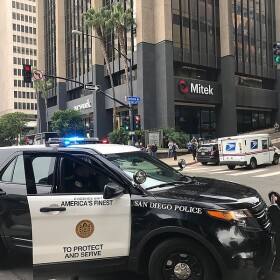The more than 5,000 law enforcement officers in San Diego County will soon get training on how to better respond to people facing a mental crisis.
A study by the San Diego County District Attorney found over the past 25 years 80% of officer-involved shootings included people who had drug or mental health issues. Last year there were more than 53,000 calls for service involving a mental health challenge.
District Attorney Summer Stephan said training officers on how to better handle these situations balances public safety with compassion and understanding.
"The goal is one that I think our community can truly embrace," Stephan said. "A reduced need to use deadly force, improved officer safety and a reduced likelihood of injury of those in crisis to the public."
The county has special teams designed to handle people in mental health crises, but Stephan said more can be done.
RELATED: San Diego Law Enforcement Teams With Mental Health Workers For Psychiatric Emergencies
All of the law enforcement agencies in the county will receive new mental health training, starting in the summer. It involves simulations of what can happen when someone’s in a crisis — and it is not just officers who will be getting this training, but also police dispatchers. Officers get similar training while going through the police academy.
The mental health training is part of a regional study done by the DA’s office, which has a number of recommendations. They include creating a system for follow-up care and opening crisis stabilization centers.








